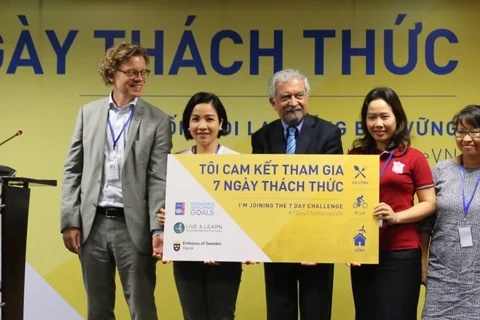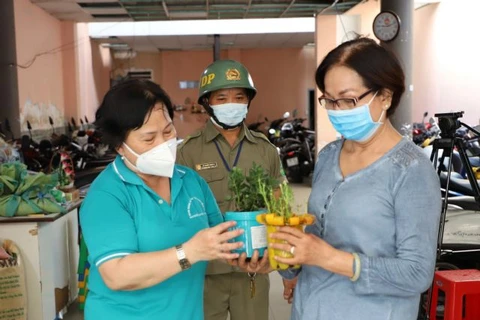HCM City (VNS/VNA) - Vietnam is ahead of the global average when it comes to adopting healthier and more sustainable lifestyle choices, according to a new public opinion report conducted by GlobeScan and supported by Visa.
Across the world, people have faced exceptional circumstances and have been forced to adapt to a new way of life.
In total, 27,000 people from 27 markets were asked about attitudes, opinions, and behaviors linked to enabling healthier and more sustainable lifestyles.
The report found that consumers in Vietnam were more likely to support socially responsible companies.
Some 47 percent of those surveyed in the country said they had supported a socially responsible company in the past year, against a global average of 33 percent.
People in Vietnam are much more likely to seek out information about healthy lifestyles. At least 82 percent of respondents said they had sought out information related to healthier lifestyles in the past year, well above the global average of 56 percent.
Those in Vietnam displayed a significantly higher interest in environmentally friendly lifestyle choices. At least 81 percent said they had sought out information about environmentally friendly lifestyles in the past year, versus a global average of 47 percent.
According to the survey, people in Vietnam are already taking proactive steps towards healthier and more sustainable lifestyles.
Ninety percent said they had made changes to their lifestyles to be more environmentally friendly in the past year, and 87 percent made changes to be healthier, while 84 percent were trying to become more helpful to others.
Dang Tuyet Dung, Visa country manager for Vietnam and Laos, said: “It is encouraging to see that consumers in Vietnam are already taking concrete steps to lead more healthy and sustainable lifestyles.”
Despite Vietnamese displaying a greater willingness to do their bit to improve their own lives, the lives of others and the environment, there is still a gap between aspiration and actual behavior.
Environmentally friendly lifestyle changes also show the same pattern. This lack of follow-through suggests there is an opportunity for guidance and solutions from key players across the world to enable healthier and more sustainable living.
This is supported by a call for greater cooperation between companies, government, NGOs and scientists to find solutions to social and environmental problems.
When asked what companies could do to help them live healthily and sustainably, people in Vietnam listed a desire for new products that are better for both people and the environment as a top priority, while affordable products and services ranked second.
With the importance of saving money, consumers rank reducing energy consumption and taking care of financial health and well-being as first and third in the list of top actions they would like to do more of in the year.
With changes to income and financial stability in the wake of the pandemic, it is likely that the priority placed on affordability will intensify.
Findings from the study also show that people are put off by actions they believe are difficult. When trying to be healthier and more sustainable, they are most likely to alter aspects of their life if they perceive it to be relatively easy to do so.
Typically, these behaviors are linked to improving personal well-being, ethical purchasing, and actions within the household (such as saving water at home, eating healthy food, choosing products with less packaging, and buying from responsible brands).
When encouraging behavior changes, evidence from this study identifies the importance of removing barriers and providing clear information./.
Across the world, people have faced exceptional circumstances and have been forced to adapt to a new way of life.
In total, 27,000 people from 27 markets were asked about attitudes, opinions, and behaviors linked to enabling healthier and more sustainable lifestyles.
The report found that consumers in Vietnam were more likely to support socially responsible companies.
Some 47 percent of those surveyed in the country said they had supported a socially responsible company in the past year, against a global average of 33 percent.
People in Vietnam are much more likely to seek out information about healthy lifestyles. At least 82 percent of respondents said they had sought out information related to healthier lifestyles in the past year, well above the global average of 56 percent.
Those in Vietnam displayed a significantly higher interest in environmentally friendly lifestyle choices. At least 81 percent said they had sought out information about environmentally friendly lifestyles in the past year, versus a global average of 47 percent.
According to the survey, people in Vietnam are already taking proactive steps towards healthier and more sustainable lifestyles.
Ninety percent said they had made changes to their lifestyles to be more environmentally friendly in the past year, and 87 percent made changes to be healthier, while 84 percent were trying to become more helpful to others.
Dang Tuyet Dung, Visa country manager for Vietnam and Laos, said: “It is encouraging to see that consumers in Vietnam are already taking concrete steps to lead more healthy and sustainable lifestyles.”
Despite Vietnamese displaying a greater willingness to do their bit to improve their own lives, the lives of others and the environment, there is still a gap between aspiration and actual behavior.
Environmentally friendly lifestyle changes also show the same pattern. This lack of follow-through suggests there is an opportunity for guidance and solutions from key players across the world to enable healthier and more sustainable living.
This is supported by a call for greater cooperation between companies, government, NGOs and scientists to find solutions to social and environmental problems.
When asked what companies could do to help them live healthily and sustainably, people in Vietnam listed a desire for new products that are better for both people and the environment as a top priority, while affordable products and services ranked second.
With the importance of saving money, consumers rank reducing energy consumption and taking care of financial health and well-being as first and third in the list of top actions they would like to do more of in the year.
With changes to income and financial stability in the wake of the pandemic, it is likely that the priority placed on affordability will intensify.
Findings from the study also show that people are put off by actions they believe are difficult. When trying to be healthier and more sustainable, they are most likely to alter aspects of their life if they perceive it to be relatively easy to do so.
Typically, these behaviors are linked to improving personal well-being, ethical purchasing, and actions within the household (such as saving water at home, eating healthy food, choosing products with less packaging, and buying from responsible brands).
When encouraging behavior changes, evidence from this study identifies the importance of removing barriers and providing clear information./.
VNA
























